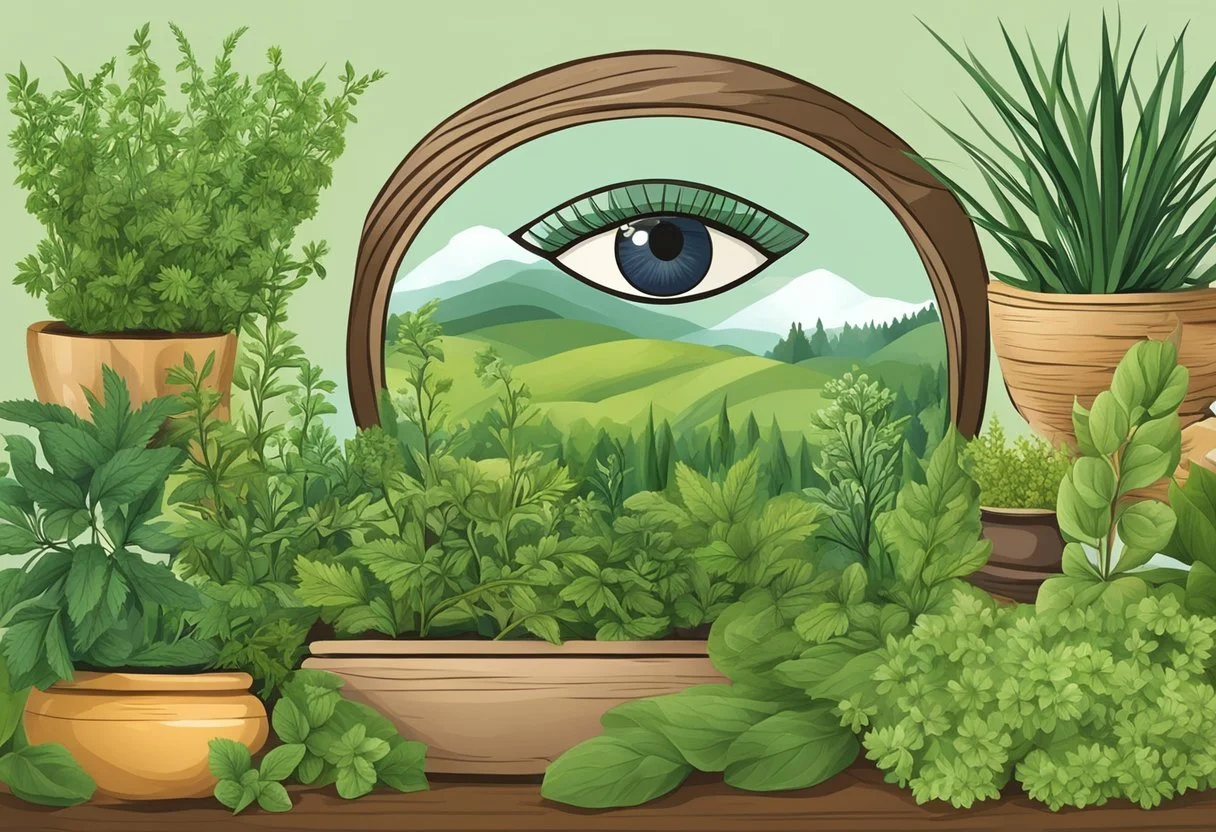Herbs for Natural Eye Care: A Comprehensive Guide to Holistic Vision
Boosting Solutions
This article is part of our series on Natural Health
Discover > Natural Health > Herbs for Natural Eye Care: A Comprehensive Guide to Holistic Vision
In the realm of natural eye care, herbs have been recognized for their potential benefits in promoting eye health and maintaining good vision. Incorporating these herbs into one's daily routine can offer an effective alternative to conventional treatments and provide relief from common eye-related concerns. This article will explore the topic of herbs for natural eye care and elucidate their potential advantages in maintaining optimal ocular health.
Some of these beneficial herbs have been used in traditional medicine practices for centuries, while others are gaining recognition in modern times for their ability to support eye health. We will discuss the various herbs that have been found to be helpful in addressing specific eye conditions, as well as the science behind their effectiveness.
By understanding the properties of these herbs and how they can benefit the eyes, individuals can explore new avenues for preserving their vision and keeping their eyes healthy. Whether it's managing symptoms of eye strain, reducing inflammation, or combating age-related eye conditions, these natural remedies can make a significant difference in one's eye care regimen.
Understanding Your Eye Health
Eye health is a crucial aspect of overall well-being that includes maintaining optimal eyesight while protecting the eyes from injury or disease. The retina, at the back of the eye, contains blood vessels and nerve cells that are essential for proper vision. The diverse array of common eye diseases such as cataracts, glaucoma, and age-related macular degeneration can impact eye health and potentially result in vision loss.
Eye fatigue and eye strain are common issues experienced by many individuals, especially in the digital age where screen use occupies a significant portion of daily life. These problems can manifest through symptoms such as dryness, itchiness, and blurry vision. It is essential to adopt good habits and understand the importance of eye care to prevent long-term issues and maintain excellent eyesight.
Natural remedies and solutions can be explored to support eye health. For instance, herbs can be considered as components of a holistic approach to eye care. Many herbs are believed to have properties that could directly or indirectly benefit eye health. By including specific herbs in one's diet or applying them as eye compresses or rinses, individuals can potentially reduce symptoms associated with eye fatigue, strain, or other common eye issues.
Finally, it is essential to consult with a professional, such as an optometrist or ophthalmologist, to create a tailored eye care plan that accounts for one's unique needs and circumstances. This plan can include lifestyle changes, preventive measures, and incorporating natural remedies like herbs alongside conventional treatments. By taking a proactive approach to eye health, individuals will not only maintain their eyesight but also foster overall well-being and quality of life.
Herbs for Natural Eye Care
Herbs have long been used to support various aspects of health, including eye care. Many of these herbs have properties that can help maintain and even improve eye health. In this section, we will discuss some of the most popular herbs for natural eye care, including bilberry, eyebright, ginkgo biloba, green tea, turmeric, fennel (how long does fennel last?), coleus, dandelion, goldenseal, milk thistle, saffron, and chamomile.
Bilberry is an herb known for its high antioxidant content, which can help protect the eyes from damage caused by free radicals. It is believed to improve night vision and overall eye health. Similarly, eyebright has been used for centuries to alleviate eye irritation and congestion, thanks to its anti-inflammatory and astringent properties.
Ginkgo biloba is another herb that can benefit eye health. Its ability to increase blood flow to the eyes helps provide essential nutrients and oxygen. This may help reduce eye strain and improve vision. Green tea is rich in antioxidants and has anti-inflammatory properties that can help protect the eyes from age-related conditions, such as macular degeneration and cataracts.
Turmeric, a popular spice with powerful anti-inflammatory and antioxidant properties, has been found to help in protecting the eyes from oxidative stress. This, in turn, can keep the eyes healthy as one ages. Fennel seeds, (how long do fennel seeds last?) on the other hand, have been used in traditional medicine to strengthen eyesight and treat various eye-related ailments.
Other herbs, such as coleus, aid in reducing intraocular pressure, which can be beneficial for individuals with glaucoma. Dandelion leaves are rich in vitamins A and C, which can help maintain healthy vision and reduce the risk of age-related eye problems. Goldenseal is an herb commonly used for its antibacterial and anti-inflammatory properties, making it a potential candidate for treating eye infections.
Milk thistle has been known for its liver-supporting properties. Since the liver is responsible for supplying nutrients to the eyes, improving liver function may contribute to better eye health. Saffron is not only a valuable spice but also a potent antioxidant that can help protect the eyes from damage. It has been shown to improve visual acuity and light sensitivity in people with age-related macular degeneration. Lastly, chamomile is widely used for its soothing and anti-inflammatory effects, which can be beneficial for tired and strained eyes.
Incorporating these herbs into one's diet or using them in the form of supplements, teas, or eye drops can contribute to healthier eyesight and improved overall eye health. However, it's essential to consult a healthcare professional before using any of these herbs, especially if one has pre-existing eye conditions or takes prescribed medications.
Major Herbal Ingredients and Their Role in Eye Health
Antioxidants and Eye Health
Antioxidants play a crucial role in maintaining eye health. They help to neutralize free radicals, which can damage cells in the eyes and contribute to age-related macular degeneration (AMD) and cataracts. Some important antioxidants for eye health include lutein, zeaxanthin, vitamin E, and beta-carotene.
Lutein and Zeaxanthin: These carotenoids are found in leafy green vegetables, egg yolks, and other colorful fruits and vegetables. They act as a protective shield for the macula, the central part of the retina, which is responsible for sharp, detailed vision.
Vitamin E: A strong antioxidant, vitamin E helps protect eye cells from damage caused by unstable molecules. It can be found in nuts, sweet potatoes, and leafy green vegetables.
Beta-Carotene: This antioxidant is converted into vitamin A in the body, which is essential for proper vision. It is abundant in carrots, sweet potatoes, and dark leafy greens.
Anti-Inflammatory Properties and Eye Health
The anti-inflammatory properties of certain herbs and compounds may also contribute to eye health. Curcumin, flavonoids, polyphenols, and omega-3 fatty acids are known for their anti-inflammatory effects.
Curcumin: Found in turmeric, this powerful compound has antioxidant and anti-inflammatory properties, which may help reduce inflammation within the eyes and support overall eye health.
Flavonoids: These natural antioxidants are present in many fruits and vegetables and have anti-inflammatory effects. Some examples include quercetin and rutin, both of which are found in apples and onions.
Polyphenols: Polyphenols, found in foods like tea, dark chocolate, and berries, have both antioxidant and anti-inflammatory properties, making them potentially beneficial for maintaining eye health.
Omega-3 Fatty Acids: Omega-3s are essential fats that have a wide range of health benefits, including reducing inflammation. They are found in fish oil, chia seeds (how long do chia seeds last?), and flaxseed, making them a potential ally for eye health.
Natural Remedies for Specific Eye Conditions
Taking care of your eyes is essential for maintaining good vision and overall eye health. There are several natural remedies available that can help improve specific eye conditions. This section will cover herbs that may be beneficial for glaucoma, macular degeneration, cataracts, and dry eyes.
Herbs for Glaucoma
Glaucoma is a condition that causes damage to the optic nerve due to increased pressure in the eye. Some herbs may help reduce intraocular pressure and support general eye health. Here are a few herbs to consider:
Ginkgo biloba: This herb is known to improve blood flow and circulation, which can be beneficial for glaucoma patients.
Bilberry: Rich in antioxidants, bilberry can help protect the optic nerve from damage and support overall eye health.
Coleus: Containing forskolin, coleus may help reduce intraocular pressure.
Herbs for Macular Degeneration
Macular degeneration is a progressive eye disease that damages the central part of the retina. Herbs with antioxidant properties may help slow down the process. Some of these herbs include:
Lutein and Zeaxanthin: These two antioxidants are found in marigold flowers and help protect the macula from damage caused by blue light.
Grape Seed Extract: (how long does grape seed extract last?) This extract contains powerful antioxidants that can improve blood circulation and protect the retina from oxidative stress.
Herbs for Cataracts
Cataracts are a common eye condition that causes the eye's natural lens to become cloudy. Certain herbs may help slow down the progression of cataracts:
Eyebright: This herb has been used traditionally for eye health and may help alleviate symptoms of cataracts.
Turmeric: Curcumin, the active ingredient in turmeric, has antioxidant properties that can help protect the lens from oxidative damage.
Herbs for Dry Eyes
Dry eyes occur when there is insufficient tear production or poor tear quality. Some herbs can help soothe and alleviate dry eye symptoms:
Chamomile: Known for its anti-inflammatory properties, chamomile can help reduce eye irritation and inflammation.
Flaxseed oil: Rich in omega-3 fatty acids, flaxseed oil can help improve tear production and promote overall eye health.
Remember to consult your healthcare provider before using any herbal remedies for eye conditions, as some herbs may interact with medications or cause side effects.
Maintaining and Improving Eyesight with Herbal Supplements
Herbal supplements have been used for centuries to promote health and well-being. In recent years, there has been a resurgence of interest in using these natural remedies to improve vision and maintain eye health. By taking herbal supplements in the form of drops, tinctures, or capsules, individuals can effectively support their eyesight and overall ocular health.
Many herbal supplements on the market today claim to improve vision and maintain eye health. Bilberry, for example, is a popular choice for promoting eye health due to its high concentration of anthocyanins, which are potent antioxidants. Research has shown that bilberry extract may help to improve night vision, protect against age-related macular degeneration, and enhance retinal blood circulation.
Another popular option is Eyebright, a traditional herb that has long been used to alleviate eye discomfort and irritation. Eyebright contains a variety of bioactive compounds, including flavonoids, which have anti-inflammatory and antioxidant properties. These beneficial properties make Eyebright popular for improving eye health and supporting overall vision.
Ginkgo Biloba is another herb that has been found to have potential benefits in maintaining and improving eyesight. This ancient tree has been widely studied for its ability to improve blood flow and protect nerve cells, including those in the eye. Ginkgo Biloba is commonly used in tinctures and capsules to support healthy vision and prevent age-related eye diseases.
Before beginning any herbal supplement regimen for your eyesight, it is essential to consult a health care professional. They can provide guidance on the appropriate dosages and combinations of herbs to ensure optimal results without causing any adverse side effects. Additionally, they can monitor progress to assess the effectiveness of the herbal supplements on your vision and overall eye health.
In conclusion, herbal supplements can be a valuable addition to one's eye care routine. By choosing high-quality products and working with a health care professional, individuals can support their vision and maintain overall eye health using these natural remedies.
Lifestyle Considerations in Eye Care
Diet and Eye Health
A well-balanced diet is essential for maintaining good eye health. It is crucial to incorporate nutrients such as zinc, omega-3 fatty acids, protein, and essential minerals in your daily meals. Consume a variety of fruits, vegetables, whole grains, lean meats, and fish sources to achieve a healthy diet.
Some specific nutrients beneficial to our eyes include:
Zinc: Found in red meat, poultry, oysters, and dairy products.
Omega-3: Found in fatty fish like salmon, walnuts (how long do walnuts last?), and flaxseeds (how long do flaxseeds last?).
Protein: Obtained from eggs, lean meats, dairy products, and legumes.
Protective Measures for Eyes
Exposure to sunlight is ubiquitous, but excessive exposure can be harmful to our eyes. It is essential to take proactive measures to shield our eyes from harmful sunlight.
Sunglasses: Wear sunglasses that block 100% of UV rays to protect your eyes from the sun's harmful effects.
Hats: A wide-brimmed hat can offer added protection by shielding your eyes from direct sunlight.
Additionally, avoiding or quitting smoke can also significantly reduce the risk of developing eye-related issues. Engaging in eye-friendly activities like taking breaks from screen time and adjusting to correct lighting can further aid in maintaining good eye health.
Impact of Sleep and Eye Care
A quality sleep routine plays a vital role in maintaining eye health. Lack of sleep can lead to issues such as eye strain and dryness. Adults should aim for 7-9 hours of sleep per night to ensure optimal eye functioning.
Stress management is also important, as high stress levels can have adverse effects on eye health. Incorporate relaxation techniques, exercise, and mindfulness activities to manage stress and promote overall well-being, subsequently benefiting eye care.
Potential Risks and Precautions
When using herbs for natural eye care, there are a few potential risks and precautions to be aware of. While herbs can offer beneficial properties to improve eye health, it is essential to use them safely and responsibly.
Inflammation and infections can occur in the eye due to various factors, including exposure to bacteria and toxins. Some herbs may have anti-inflammatory and antibacterial properties that may help reduce these risks, but it is important to recognize that not all herbs are suitable for all situations. Individuals with a genetic predisposition to eye infections or a history of eye inflammation should consult with their healthcare provider before using herbal remedies for eye care.
Herbs can also interact with other medications or supplements, causing unexpected complications. For example, some may impact blood sugar control, which could be of concern for those managing diabetes. It is crucial for individuals who are on prescription medications or have pre-existing health conditions to discuss their herbal eye care options with their healthcare provider to ensure they choose safe and suitable treatments.
During World War II, there was limited access to comprehensive eye exams, which highlighted the importance of the prevention and recognition of eye health issues. Regular eye exams should still be conducted, even when using herbal remedies for eye care, to ensure the early detection and treatment of potential problems.
Free radicals can contribute to the degeneration of eye health, and while some herbs have antioxidant properties that may help neutralize these free radicals, not all herbs will provide this benefit. Therefore, it's essential to research and select herbs specifically known for their antioxidant properties when aiming to protect against free radical damage.
Although it may be unrelated, some women experience eye discomfort or changes in vision during their menstrual cramps. Using herbal remedies to manage menstrual cramps may indirectly improve eye comfort during this time. However, it is important to discuss these issues with a healthcare provider if any concerns arise.
In conclusion, using herbs for natural eye care requires considering potential risks and precautions. Always consult with a healthcare provider before starting any herbal remedies, and ensure regular eye exams are maintained to monitor overall eye health.
Natural Health Solutions for Personal Care and Skin Health
Natural health practices can provide a range of benefits for personal care and skin health. Natural homemade toothpaste can be made with ingredients like baking soda (how long does baking soda last?), coconut oil, and peppermint essential oil to provide a natural and effective alternative to commercial toothpaste. These ingredients can help to promote healthy teeth and gums without the use of harmful chemicals.
Lip balms can be made with natural ingredients like beeswax, shea butter, and essential oils to provide a natural and effective solution for dry, chapped lips. These ingredients can be melted together and poured into small containers for easy use.
Witch hazel can be used as a natural remedy for vaginal health. Its anti-inflammatory and antibacterial properties can help to reduce inflammation, itching, and irritation. It's important to dilute witch hazel with water before use and to consult with a healthcare professional before using any new remedies.
Food supplements can help to promote healthy skin from the inside out. Supplements like omega-3 fatty acids, vitamin D, and probiotics can help to reduce inflammation, promote healthy gut bacteria, and support overall skin health.
By incorporating natural health practices into your daily routine and making healthy choices for personal care and skin health, you can support your overall health and well-being in a sustainable and holistic way. It's important to do your own research and consult with a healthcare professional before using any new remedies or making significant changes to your diet or lifestyle.
#herbs for eye wash #healthy eyesight #healthy eyes #maintaining healthy eyesight #develop noticeable symptoms #boost eye health #improving night vision #herbal tea #herbal eyewash




